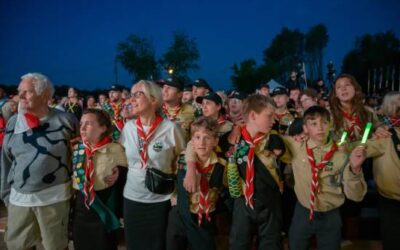Jesus Christ’s resurrection, celebrated on many Easter-related holidays, is central to the beliefs of the Seventh-day Adventist Church. And that means we seek every opportunity to remember it.
However, we don’t have any set rules on what holidays we should keep or avoid.
Rather, we encourage each member to make these decisions based on biblical principles and conscience.
We’ll look more at those principles as we answer the following questions:
- How do Adventists decide which holidays to celebrate?
- What do Adventists believe about various Easter-related religious holidays?
- What holidays do Adventists keep?
Because holiday celebration is a personal decision, we can’t account for every viewpoint. But keep reading to get an idea of what most Adventists do for these various holidays.
How do Adventists decide which holidays to celebrate?

Photo by Denis Gvozdov
Bible principles and conscience guide Adventists in deciding which holidays to celebrate. After all, the Bible doesn’t directly address most modern holidays. What’s more, holidays are largely based on cultural context, meaning that various holidays are celebrated differently depending on the part of the world.
That’s why evaluating a holiday starts with checking whether the purpose of the holiday aligns with Christian principles. Then we can look at what the observance of that holiday looks like and how it might impact our relationship with Jesus Christ.
To make this decision, we might ask ourselves the following questions:
- How does this holiday relate to my beliefs? (John 4:24; 1 Thessalonians 5:5; 1 John 1:6).
- How does observing this holiday affect my behavior? (Galatians 5:13-14; Romans 12:1-2).
- How does observing this holiday affect the way I treat others? (Philippians 2:3-4; Romans 12:10-13).
- How does observing this holiday affect my relationship with God? (Matthew 6:33; Romans 8:7-10).
And holiday observance isn’t a one-size-fits-all situation because each person might answer these questions differently. The way one person observes a holiday might lead them to become greedy or excessive. Meanwhile, the same holiday might encourage someone else to share their blessings with others and reflect on all the good things God has given them.
For this reason, the Adventist Church hasn’t made any official rules about holiday observance. It’s not about a denominational standard but personal conviction.
That being said, let’s take a look at how most Adventists view popular holidays connected with Jesus’ resurrection.
What do Adventists believe about various Easter-related religious holidays?
Adventists appreciate that many Easter-related religious holidays draw attention to Christ’s sacrifice on Calvary. His death and resurrection form the foundation of our faith in Him as our promised Messiah and give us hope that we, too, can be free from sin’s power and receive eternal life.
As Paul says:
“But if there is no resurrection of the dead, then Christ is not risen. And if Christ is not risen, then our preaching is empty and your faith is also empty” (1 Corinthians 15:13-14, NKJV).
In light of the importance of the resurrection, here’s how we typically relate to the following holidays.
Passover

Photo by cottonbro studio
Most Adventists don’t celebrate Passover, though we still recognize and appreciate its valuable lessons. God gave this feast to the Israelites to remind them of their deliverance from Egypt (Exodus 12). At the same time, it also foreshadowed the coming Messiah and His sacrifice.
Let’s go back to when Passover was first kept.
The Israelites had been in slavery in Egypt. But things were changing as God guided Moses to request their release from the Pharaoh of Egypt. When Pharaoh refused, God sent ten different plagues upon Egypt.
The final plague was the death of every firstborn in Egypt. In preparation for this tragedy, God instructed the Israelites to kill a lamb and spread its blood over the doorposts of their homes. When the angel of death passed through Egypt, God spared, or “passed over,” every home that had the blood painted on their doorposts.
Thus, Passover became a memorial of how God saved His people (Exodus 12:14-17). And God also intended for the Passover to remind the Israelites that He would deliver them from sin and death once and for all through the blood of the Son of God (Acts 4:12).
The blood of the Passover lamb symbolized the blood of Christ, the Lamb of God (John 1:29).
Now, though, Christians no longer sacrifice animals as was done in the Old Testament because Jesus fulfilled those sacrifices and the feasts associated with them. These include:
- Passover
- The Feast of Unleavened Bread
- The Feast of Firstfruits
- Pentecost
- The Feast of Tabernacles
The entire purpose of many of these festivals in the Old Covenant law was to point forward to the soon-coming Christ. Jesus’ death brought about the New Covenant (Hebrews 8:6, 13; Romans 8:1-4), doing away with the requirements of the law of Moses, such as keeping these feasts or practicing circumcision (Acts 15; Colossians 2:14).
They didn’t need to point toward Jesus’ coming anymore because Jesus had already come.
In fact, Jesus established a new ceremony in place of Passover called the Lord’s Supper. The Lord’s Supper, otherwise known as the Last Supper, serves to remind us of Jesus’ death and point forward to His second coming (Luke 22:15-20).
Adventists keep the Lord’s Supper, which we often call Communion, for this very reason.
Lent and Ash Wednesday

Photo by Ahna Ziegler on Unsplash
Keeping Lent or Ash Wednesday is quite uncommon among Adventists—mainly because we feel these holidays connect to concepts that deviate from Bible principles, such as salvation by faith in Christ alone.
Ash Wednesday marks the first day of Lent, which is a 40-day-long fast that commemorates Jesus’ fast in the wilderness (Matthew 4:1-11).1 This day is all about preparing for this fasting process. One way participants do this is by having their foreheads marked with ash by a priest to signal their commitment to Lent.2 During the 40-day period, they may avoid certain foods (like meat) or give up some kind of pleasure on certain days (like sweets or social media).
Adventists wholeheartedly believe in participating in spiritual practices just as Jesus did, whether fasting or prayer.
But we also feel the motive behind these practices is key.
What gives us pause is that Lent and Ash Wednesday tend to promote a saved-by-works mentality. These holidays can go so far as teaching participants that fasting and observing Ash Wednesday are sacramental acts, which play a part in helping them earn their salvation.3 Those who observe Holy Week understand sacramentals as actions that give a person grace or make a person holy.
In contrast, we believe that salvation is a free gift given by Jesus, obtained when we accept His sacrifice, which pays the cost of our sin. We can’t earn it—no matter how hard we try.
For us, spiritual practices are simply expressions of faith and commitment to follow God.4 We desire to keep holidays in which we feel we can support this biblical view of spiritual practices.
This comes into play with other holidays associated with Holy Week, too.
Palm Sunday
Just as most Adventists don’t celebrate Ash Wednesday or Lent, we also don’t celebrate Palm Sunday. Again, the main reason is the saved-by-works mentality it tends to emphasize.
Palm Sunday marks the first day of the week for Holy Week.5 On this day, Christians celebrate Jesus’ entrance into the city of Jerusalem on a donkey when people recognized Him as the Messiah (Matthew 21:1-11).6 People waved palm branches and placed them on the road before Jesus (Matthew 21:8), so a big part of Palm Sunday involves processions where people wave palm branches.7
Like Ash Wednesday and Lent, people view Palm Sunday as a sacramental practice.8 This means that it may encourage them to pursue sacraments for the sake of salvation. Some even believe that the palms they use can grant them holiness.9
In this way, the general emphasis of Palm Sunday takes our attention away from Jesus and puts it on symbols and ceremonies—even to the extent of making something holy that the Bible doesn’t designate as such.
So, are there any days during Holy Week that Adventists more commonly celebrate?
Good Friday

Photo by Alicia Quan on Unsplash
Because of our deep value for Christ’s sacrifice on our behalf, Adventists see Good Friday as one opportunity to reflect on this event. We typically celebrate differently than most churches, though.
Many churches spend this day fasting as they mourn the death of Christ.10 And most Catholic churches spend it reflecting on Christ’s sacrifice as they walk through the stations of Christ, or images of Christ’s journey to the Cross.11
The celebration of Good Friday is a bit more understated in Adventist communities.
Most of our Good Friday celebrations are reserved for Friday night vespers. Vespers is a worship service Adventist congregations host to celebrate the beginning of the Sabbath. These services generally feature music, prayer, and a spiritual message.
On Good Friday, the vespers program may have a special emphasis on the Easter story. Some churches might read Bible passages about it before having some prayer time. These programs could also include a light potluck or even a Communion service.
Easter
Easter celebrations are quite common among Adventists. Though we may not hold Sunday worship services on Easter, we usually commemorate the Easter story during our regular Sabbath services.
Of course, we believe in regularly reflecting on what Jesus did for us and drawing closer to Christ. But because society recognizes this holiday, it’s a wonderful opportunity to reach out to and serve our community.
Aside from that, some Adventists may enjoy typical Easter activities, such as family dinners or Easter egg hunts. This will depend a lot on family tradition and personal choice.
On the other hand, some Adventists may choose not to celebrate Easter because they feel uncomfortable with the pagan origins of some of its traditions. Again, this doesn’t mean they don’t celebrate the Resurrection—they just choose to do so in other ways apart from the cultural aspects of Easter.
To get a full understanding of what Adventists think about Easter, check out “Do Seventh-day Adventists Celebrate Easter?”
What holidays do Adventists keep?

Photo by Ian Schneider on Unsplash
As we’ve mentioned, the Seventh-day Adventist Church has no official rules regarding what holidays we keep. Instead, we decide whether to observe certain holidays based on our individual consciences.
You will find that most Adventists do celebrate popular holidays like Christmas and New Year. We also get involved in national holidays—Thanksgiving and Fourth of July for those in the United States.
And as we mentioned in this article, celebrating Good Friday and Easter is also quite common among Adventists.
But in the case of many holidays, observing them has a lot to do with culture. As long as a certain holiday aligns with the principles we understand from the Bible, we will enjoy that cultural practice. We may even integrate our religious practices and beliefs into it.
To see what this looks like with other holidays, head on over to
Basic Biblical Principles for Observing Holidays
When deciding whether to observe a particular holiday, ask yourself:
- How does this holiday relate to my beliefs? (John 4:24; 1 Thessalonians 5:5; 1 John 1:6).
- How does observing this holiday affect my behavior? (Galatians 5:13-14; Romans 12:1-2).
- How does observing this holiday affect the way I treat others? (Philippians 2:3-4; Romans 12:10-13).
- How does observing this holiday affect my relationship with God? (Matthew 6:33; Romans 8:7-10).
Related Articles
- “Lent,” Encyclopedia Britannica. [↵]
- “Ash Wednesday,” Encyclopedia Britannica. [↵]
- “Sacrament,” Merriam-Webster Dictionary. [↵]
- “Sacraments,” Ellen White Estate. [↵]
- “Palm Sunday,” Encyclopedia Britannica. [↵]
- Ibid. [↵]
- Ibid. [↵]
- Ibid. [↵]
- “Catholic Activity: Blessed Palms in the Home,” Catholic Culture. [↵]
- “Good Friday,” Encyclopedia Britannica. [↵]
- Crawford, Benna, “How Do Catholics Celebrate Good Friday?” Classroom. [↵]
More Answers
Do Seventh-Day Adventists Have “Rules” For Clothing?
Many religions have guidelines on dress, but what about the Adventist Church? Discover how Adventists choose to dress based on biblical principles.
11 Reasons People Become Seventh-day Adventists
Curious why many people become Adventists? Here are elements of Adventist beliefs, values, and mission often reflected in people’s decisions to join.
What’s the Seventh-day Adventist General Conference Session?
At the General Conference Session, Adventist delegates from around the world gather to assess the state of the organization, pray, and discuss current issues. Here’s how it works.
How Adventists View the End of the World
The end of the world is no fun to think about. But here’s how we can actually find hope and comfort in what’s to come.
What Is an Adventist Medical Missionary?
A medical missionary in the Adventist Church is someone who cares for the medical needs of people as a way of showing the love of Jesus. They may travel to another country, or even just serve in their hometown.
Is the Seventh-day Adventist Church Protestant?
Learn how the beliefs of the Seventh-day Adventist Church align with the “5 solas” of Protestantism.
Are Seventh-day Adventists Evangelicals?
According to its origins and definition, evangelicalism is about following Jesus and the Bible and sharing the Gospel through the way we live our lives. Adventists wholeheartedly harmonize with these principles.
Could Anything Keep Me from Becoming an Adventist?
We are each saved through Christ. But when it comes to church membership, are there certain beliefs or expectations to become an Adventist?
Do Seventh-day Adventists Have “Rules”?
We uphold principles we believe will help us maintain a closer relationship with Jesus and His Word. Learn how these principles guide Adventist lifestyles.
Do Seventh-day Adventists Have “Rules” For Marriage?
Around the world, many cultures and religions have various marriage traditions, expectations, or even rules when it comes to choosing a partner, planning the wedding, extended family logistics, or a number of other things.
Can a Seventh-day Adventist Marry a Non-Adventist?
Yes. Seventh-day Adventists are not under any official rules that dictate who they can or cannot marry. This is a personal, life-altering decision between the couple and God.
What Adventists Believe About Alcohol and Tobacco Use
The Seventh-day Adventist Church has historically discouraged the use of alcohol and tobacco. Even before the church started in 1863, its leaders were realizing the negative effects of these substances.
Jewelry—Why Do Many Seventh-day Adventists Choose Not to Wear It?
If you walk into a Seventh-day Adventist church service, you might notice that many people aren’t wearing earrings, bracelets, necklaces, or sometimes even wedding rings.
International Pathfinder Camporee
Youth aged 10-15 in the Adventist Church’s global Pathfinder program look forward to the International Camporee every 5 years. This event brings together Pathfinders from around the world for exciting activities.
How Adventists interpret Bible prophecy
Bible prophecy conjures up a variety of emotions in people. For some, it feels exciting or mysterious.
Moviegoers’ Guide to The Hopeful: The Facts Behind the Film
Learn where and when you can watch The Hopeful and how to get tickets. Already seen it? We’ll uncover the real story that inspired this film.
How Are Seventh-day Adventists Different from Other Protestants?
As a Protestant Christian denomination, the Seventh-day Adventist Church regards the Bible as the ultimate guide and looks to Jesus Christ as the only way to salvation. We do have some differences of belief or interpretation when it comes to topics like Bible prophecy, end-time events, the Sabbath, and a person’s state after death.
How Adventists Handle Death and Funerals
Most Seventh-day Adventist funeral services are similar to those of other Protestant denominations, such as Methodists, Baptists, or Presbyterians, but you might find a few differences or unique nuances.
Adventist Culture
Many Seventh-day Adventists adhere to specific lifestyle principles that can make them stand out from those in other Christian denominations. Whether it’s going to church services on Saturday or eating the popular Adventist entrée of “haystacks.”
An Overview of Seventh-day Adventist Higher Education
The Seventh-day Adventist Church has about 118 tertiary schools around the world. Though many of them are within North America, you’ll also find Adventist universities in countries across the world—places like Croatia, Austria, Brazil, Madagascar, and the Philippines.
The Ten Commandments from a Seventh-day Adventist Perspective
Ever eaten a salad and gotten a big piece of green stuck in your teeth? And you didn’t realize it was there until you looked in the mirror? (Because no one ever told you!)
The Benefits of A Seventh-day Adventist Academy
Adventist academies are high schools (grades 9-12) that are owned and operated by the Seventh-day Adventist Church.
Are Seventh-day Adventists Christians?
Yes, the Seventh-day Adventist Church is a Protestant Christian denomination formed in 1863. Just like other Christians, we believe that Jesus Christ is our Savior and seek to follow the principles of the Word of God.
Adventist Movies: Where Faith and Film Meet
The Adventist Church uses film to share our faith and uplift positive values. Learn more about specific Adventist-produced films and where to find them.
Do Adventists Celebrate Christmas?
In general, most Seventh-day Adventists do celebrate Christmas.
Since our denomination doesn’t have specific guidelines about holidays, it’s up to each member to decide whether to celebrate it based on their personal convictions and study of the Bible.
What Does the Bible Say About Modesty
Seventh-day Adventists and Christians in general try to ensure their outward presentation and lifestyle glorify God. This often involves daily habits like the ways we hold conversations, the ways we dress and accessorize, and the ways we regard other people when we’re out and about.
How Do Adventists Make Movie and Music Choices?
How do Adventists decide what music to listen to and which movies to watch? Learn how Bible principles can help us make better entertainment choices.
Does the Seventh-day Adventist Church Believe in Paying Tithe?
Seventh-day Adventists believe in paying tithe and offerings based on the biblical command and our commitment to being wise stewards of God’s resources. These donations help fund the mission of the Adventist Church by supporting pastors, missionaries, church expenses, and evangelistic projects, among other things.
Seventh-day Adventist World Population and Demographics
The Adventist Church has more than 22 million members and 100,000 churches worldwide, plus a large system of hospitals, schools, and publishing houses. Learn more about this diverse church.
Didn’t find your answer? Ask us!
We understand your concern of having questions but not knowing who to ask—we’ve felt it ourselves. When you’re ready to learn more about Adventists, send us a question! We know a thing or two about Adventists.































